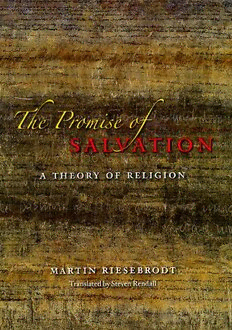Download The Promise of Salvation: A Theory of Religion PDF Free - Full Version
Download The Promise of Salvation: A Theory of Religion by Martin Riesebrodt in PDF format completely FREE. No registration required, no payment needed. Get instant access to this valuable resource on PDFdrive.to!
About The Promise of Salvation: A Theory of Religion
Why has religion persisted across the course of human history? Secularists have predicted the end of faith for a long time, but religions continue to attract followers. Meanwhile, scholars of religion have expanded their field to such an extent that we lack a basic framework for making sense of the chaos of religious phenomena. To remedy this state of affairs, Martin Riesebrodt here undertakes a task that is at once simple and monumental: to define, understand, and explain religion as a universal concept. Instead of propounding abstract theories, Riesebrodt concentrates on the concrete realities of worship, examining religious holidays, conversion stories, prophetic visions, and life-cycle events. In analyzing these practices, his scope is appropriately broad, taking into consideration traditions in Judaism, Christianity, Islam, Buddhism, Daoism, and Shinto. Ultimately, Riesebrodt argues, all religions promise to avert misfortune, help their followers manage crises, and bring both temporary blessings and eternal salvation. And, as The Promise of Salvation makes clear through abundant empirical evidence, religion will not disappear as long as these promises continue to help people cope with life.
Detailed Information
| Author: | Martin Riesebrodt |
|---|---|
| Publication Year: | 2010 |
| ISBN: | 9780226713915 |
| Pages: | 244 |
| Language: | English |
| File Size: | 1.133 |
| Format: | |
| Price: | FREE |
Safe & Secure Download - No registration required
Why Choose PDFdrive for Your Free The Promise of Salvation: A Theory of Religion Download?
- 100% Free: No hidden fees or subscriptions required for one book every day.
- No Registration: Immediate access is available without creating accounts for one book every day.
- Safe and Secure: Clean downloads without malware or viruses
- Multiple Formats: PDF, MOBI, Mpub,... optimized for all devices
- Educational Resource: Supporting knowledge sharing and learning
Frequently Asked Questions
Is it really free to download The Promise of Salvation: A Theory of Religion PDF?
Yes, on https://PDFdrive.to you can download The Promise of Salvation: A Theory of Religion by Martin Riesebrodt completely free. We don't require any payment, subscription, or registration to access this PDF file. For 3 books every day.
How can I read The Promise of Salvation: A Theory of Religion on my mobile device?
After downloading The Promise of Salvation: A Theory of Religion PDF, you can open it with any PDF reader app on your phone or tablet. We recommend using Adobe Acrobat Reader, Apple Books, or Google Play Books for the best reading experience.
Is this the full version of The Promise of Salvation: A Theory of Religion?
Yes, this is the complete PDF version of The Promise of Salvation: A Theory of Religion by Martin Riesebrodt. You will be able to read the entire content as in the printed version without missing any pages.
Is it legal to download The Promise of Salvation: A Theory of Religion PDF for free?
https://PDFdrive.to provides links to free educational resources available online. We do not store any files on our servers. Please be aware of copyright laws in your country before downloading.
The materials shared are intended for research, educational, and personal use in accordance with fair use principles.

